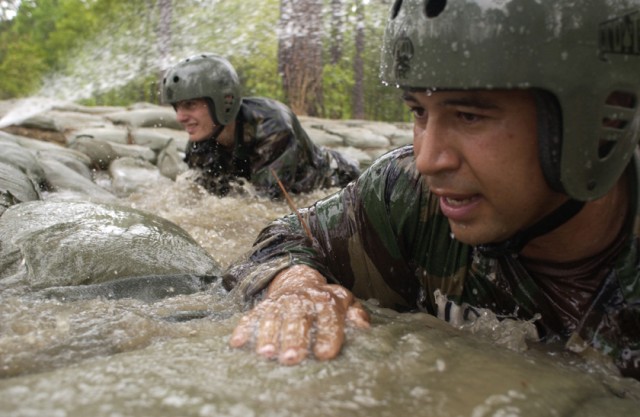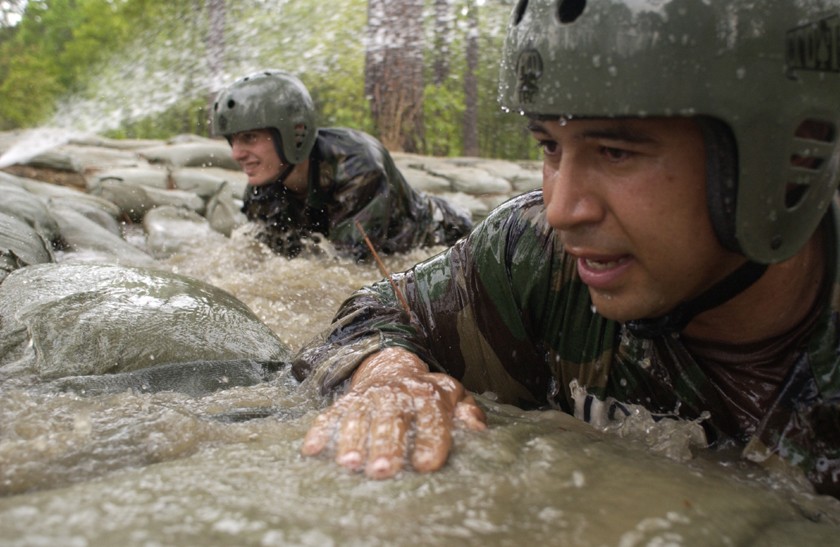
FORT BRAGG, N.C. -- United States Military Academy and Army ROTC cadets typically balance four years of college education with land navigation, battle drills and the five-paragraph operations order. Many are lucky to wear airborne or air assault wings by the time they graduate and become second lieutenants.
A very select, even luckier few, will be commissioned having had an experience that most officers wait years to break into the chance to train alongside Special Forces Soldiers with the U.S. Army John F. Kennedy Special Warfare Center and School.
First and foremost a training opportunity for the Army's best and brightest young men, SWCS has opened three SOF courses to senior Army cadets over the summer: Special Forces Assessment and Selection, and the Survival, Evasion, Resistance and Escape course at Fort Bragg, and the Combat Diver Qualification Course in Key West, Fla.
"The payoff is for the military in general," said Master Sgt. J.T. Reed, the CDQC operations noncommissioned officer. "These cadets go home with a profound understanding of what NCOs and troops should be doing."
"The combat diver qualification course is run, driven, mentored and taught by NCOs and I think it's important for these cadets to see the best of what the NCO corps has to offer," Reed said. "If two or three of them become Special Forces officers, that's a huge bonus, but the Army's benefits no matter where they go from here."
As the summer progresses, eight out of nine cadets completed SFAS, eight of eight completed SERE, and 23 of 25 are expected graduate the CDQC.
By opening training slots to the U.S. Military Academy at West Point, and U.S. Army Cadet Command, SWCS is also helping to demystify a special operations community that is generally unfamiliar to unseasoned young officers.
"This is a great way to get potential special operations officers interested in our brotherhood," said Fred Ruoff, SWCS deputy G-3. "In essence, we're trying to build the force."
While 2010 is not the first year cadets have been involved with SWCS training, Ruoff said the program has expanded for this summer. Following suit, Ruoff said the cadets' graduation rates have risen this year.
"There's no doubt in my mind that they were prepared physically and mentally," Reed said. "While nobody could've prepared them for the stressors of the course and the ocean, they handled themselves well."
As any Soldier would expect for a future Army officer, course standards and expectations were not lowered to account for age or lack of experience. Cadets were required to perform at the same level as any SOF Soldier.
Reed said that in the CDQC, cadets benefited from the cooperation and expertise from seasoned Soldiers.
"The Special Forces NCOs and officers, who were students alongside the cadets, were available to help them when it came to military knowledge and culture," Reed said. "Once they were given guidance and direction from their classmates, the cadets snapped to and performed."
West Point and Cadet Command both ran their own selection processes to ensure their cadets were ready for the rigorous training offered at SWCS. Potential CDQC students were also required to pass a pre-SCUBA course.
"They meet the same criteria as anyone else," Ruoff said. Cadets selected after completing SFAS retain the right to attend the Special Forces Qualification Course within five years of selection - the same offer extended to all active and National Guard Soldiers following selection.
"Those eight dudes got their ticket punched," Ruoff said. "They were not just there to check the block." As officers, the cadets will be able to attend the SFQC as captains or senior lieutenants.

Social Sharing